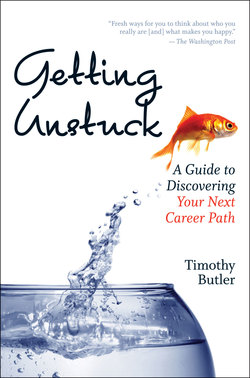Читать книгу Getting Unstuck - Timothy Butler - Страница 6
На сайте Литреса книга снята с продажи.
INTRODUCTION
ОглавлениеIn 1995, Betsy Sloan was thirty-five years old and had worked her way into “the perfect job.” As a CPA in a large California insurance company, she had a great salary, stock options, a “fabulous boss,” and hours that were the envy of her friends.
“And I was miserable,” she says today. She leans comfortably into the back of a chair, her dark eyes sharply focused behind her stylish, orange-framed glasses. “The art of the deal, the big transaction— that never did it for me. What was worse, I could project thirty years into the future and know exactly what I’d be doing every quarter—making SEC filings, doing internal reporting for the CFO. It was mind-numbing.”
“I felt totally stuck,” she adds. “I made too much money to quit, but I hated not being able to do what I really wanted.”
Betsy had never been encouraged to “do what she really wanted.” Her middle-class, suburban family had urged her to develop strong skills and then find a job that would set her up for life. Always good at pleasing teachers, parents, and professors, she’d earned a 4.0 average in high school, won a full scholarship to college, excelled in accounting, and landed a job in a “Big Eight” CPA firm. After six years, she moved to the dream job at the insurance company.
Then one day she decided she couldn’t do it anymore. She quit and left the office—and its financial security—the very same day. Betsy moved in with her parents and started taking classes at the local community college. One of those classes was creative writing. “I started writing about what I loved,” she recalls. “I realized that I had been happiest in my life when I was in school. I loved that environment. Actually, I’d always secretly wanted to be a teacher. So I took the subject-matter proficiency classes to be a math teacher, and then I applied to graduate school for a master’s in education.”
By the time she turned thirty-eight, Betsy was teaching ninthgrade algebra and pre-calculus honors at a Seattle public high school. She had gone from making $106,000 a year to making $34,000. And she was loving every minute of it.
All of us, like Betsy, can suddenly find ourselves stuck and miserable. These feelings might come at predictable moments: with the loss of a job; the end of a romance; the departure of a child and the sudden yawning of an empty nest; or the death of someone who has long helped us feel recognized, loved, and appreciated. But they might also come at unpredictable moments: when the job of a lifetime somehow loses its juice; when we ache for intimacy but can’t seem to find the right partner; when we find ourselves longing to renew a sense of life’s adventure.
At these moments, we find ourselves at an impasse, and we suffer. At work we feel stale or unchallenged—or fret that we are not progressing to a more rewarding role. In our personal lives we feel agitated, deflated, or downright bored. We are desperate to discover a meaningful way to contribute at work, to find a reinvigorated role in our families, and to dive back into the current of our own lives. We sense that life is flowing all around us, but we sit like a boulder in a river, yearning to be swept along and transformed by the river’s great energy.
The experience of being carried off by this energy is the surge of life, a time when our ideas and the will to act on them come from a well deeper than our own small selves. We feel connected; we get things done; we sense something exciting is at hand. We are, as the psychologist Mihaly Csikszentmihalyi would say, “in the flow.”
When we are at an impasse, we often cannot even sense this flow—or see how close we are to a dynamic dislodging that would place us back into the energy of the moving current. When we are feeling stuck, we forget that the next thing that will wake us up and energize us deeply is already in motion upstream, moving toward our awareness. When we have run aground, we sometimes fail to realize that this is a necessary crisis; without it we cannot grow, change, and—eventually—live more fully in a larger world.
